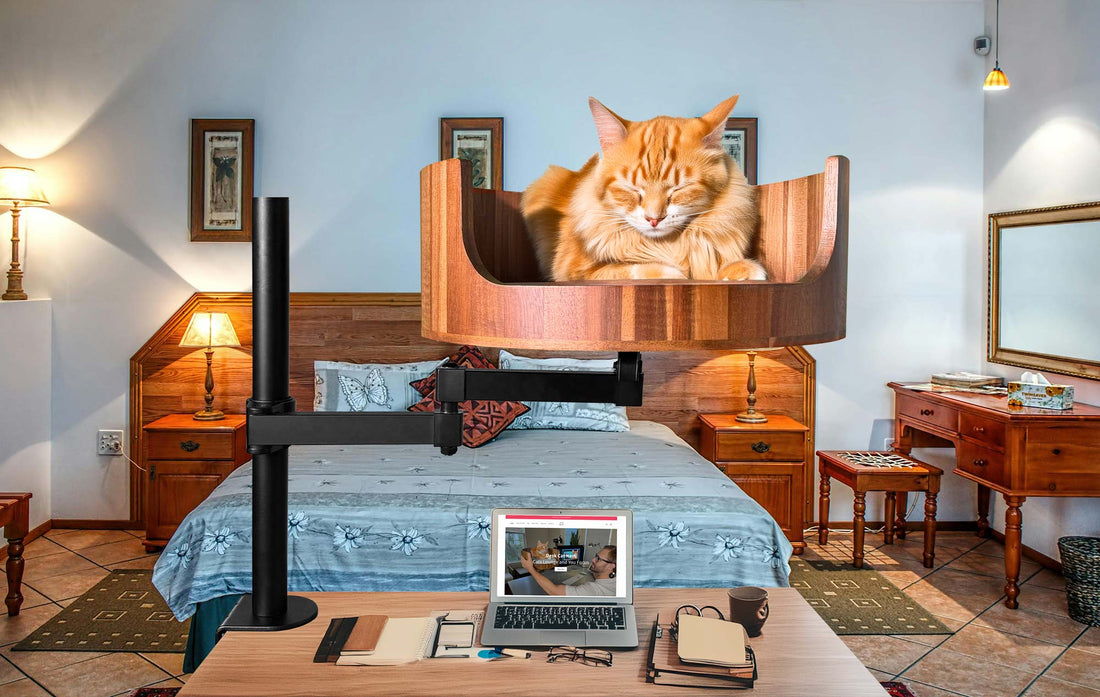
Why Do Cats Bite Your Scalp: Understanding Feline Behavior
Share
If you've ever had the bizarre experience of having your cat bite your scalp while you're working at your desk, you're not alone. Cats have a tendency to display some curious behaviors, and biting the top of your head may seem like a strange and unexplainable action. However, understanding feline behavior can provide some insight into why your furry friend may be engaging in this peculiar behavior. In this article, we will delve into the reasons behind why cats bite your scalp, how this behavior may be linked to their natural instincts, and what you can do to prevent this behavior from occurring.
Desk Cat Nest is a term used to describe the phenomenon of cats perching on their owner's desks, sometimes even nesting on their head or shoulders. While it may seem harmless or even endearing, the act of biting your scalp can be distressing and confusing. By exploring the reasons behind why cats engage in this behavior, we can gain a better understanding of our feline companions and learn how to better interact with them. Stay tuned as we uncover the mysteries of why cats bite your scalp and how you can foster a more harmonious relationship with your furry friend.
1. Cats may bite your scalp as a form of play or communication, and understanding their body language can help prevent such behavior.
2. Providing appropriate toys and mental stimulation for your cat can help redirect their biting tendencies away from your scalp.
3. Regular grooming and attention to your cat's needs can reduce their desire to play aggressively.
4. Seeking advice from a veterinarian or animal behaviorist can help address underlying issues causing scalp biting.
5. Creating a comfortable and stimulating environment for your cat will promote healthy behavior and prevent unwanted biting.
Understanding Cat Behavior
Cats exhibit a wide range of behaviors that may seem puzzling to humans. One common behavior is biting, which can be attributed to a variety of reasons such as playfulness, attention-seeking, aggression, or overstimulation. Understanding the underlying motivations behind these actions can help cat owners better respond to their pets' needs.
Exploring the Instinctual Behavior of Cats
Cats are instinctual animals with natural hunting and predatory behaviors. Biting can be a way for cats to express their instincts, whether it's pouncing on moving objects or asserting dominance. By recognizing these primal behaviors, cat owners can create a stimulating environment for their pets that satisfies their natural instincts.
Signs of Stress or Anxiety in Cats
Biting may also be a sign of stress or anxiety in cats. Cats may resort to biting as a coping mechanism when they feel overwhelmed or threatened. It's important for cat owners to observe and understand their cats' body language and behavior to address any underlying issues that may be causing stress or anxiety.
Training and Behavioral Modification Techniques
For cat owners dealing with biting behavior, training and behavioral modification techniques can be effective in curbing this behavior. Positive reinforcement, redirection, and providing appropriate outlets for play and exercise can help redirect cats' biting tendencies. Consulting with a professional trainer or behaviorist can also be beneficial in addressing more severe cases of biting behavior.
Frequently Asked Questions
Why do cats bite my scalp?
Cats may bite your scalp for a variety of reasons, including playfulness, seeking attention, asserting dominance, or as a form of grooming. It's important to understand your cat's behavior and body language to help determine the reason for the biting.
How can a Desk Cat Nest help prevent my cat from biting my scalp?
A Desk Cat Nest provides your cat with a comfortable and secure place to rest, play, and observe their surroundings. By giving your cat their own designated space, they may be less likely to engage in behaviors like scalp biting. Plus, the Desk Cat Nest can help redirect your cat's energy and provide mental stimulation, reducing the likelihood of biting.
Is scalp biting a sign of aggression in cats?
Scalp biting can sometimes be a sign of aggression in cats, especially if accompanied by other aggressive behaviors like hissing, growling, or swatting. It's important to monitor your cat's body language and behavior to determine if the scalp biting is a playful behavior or a sign of aggression. Consulting with a veterinarian or animal behaviorist may also be helpful in addressing any aggression issues.
Can training techniques help discourage scalp biting in cats?
Training techniques, such as positive reinforcement, redirection, and providing appropriate outlets for your cat's energy, can help discourage scalp biting in cats. Consistency and patience are key when working to modify your cat's behavior. If you're unsure about training methods, seeking guidance from a professional trainer or behaviorist can be beneficial.
In conclusion, investing in a Desk Cat Bed is a valuable choice to help prevent your cat from biting your scalp. This cozy and comfortable bed provides a designated space for your feline friend to rest and relax, reducing the likelihood of them seeking out human heads for comfort. By offering a comfortable alternative, you can protect your scalp from unwanted nibbles while providing your cat with a safe and cozy spot to rest. Additionally, the Desk Cat Bed promotes healthy boundaries and reinforces positive behavior, making it a beneficial tool for both you and your furry companion. Say goodbye to scalp nibbles and hello to peace of mind with the Desk Cat Bed.



















































